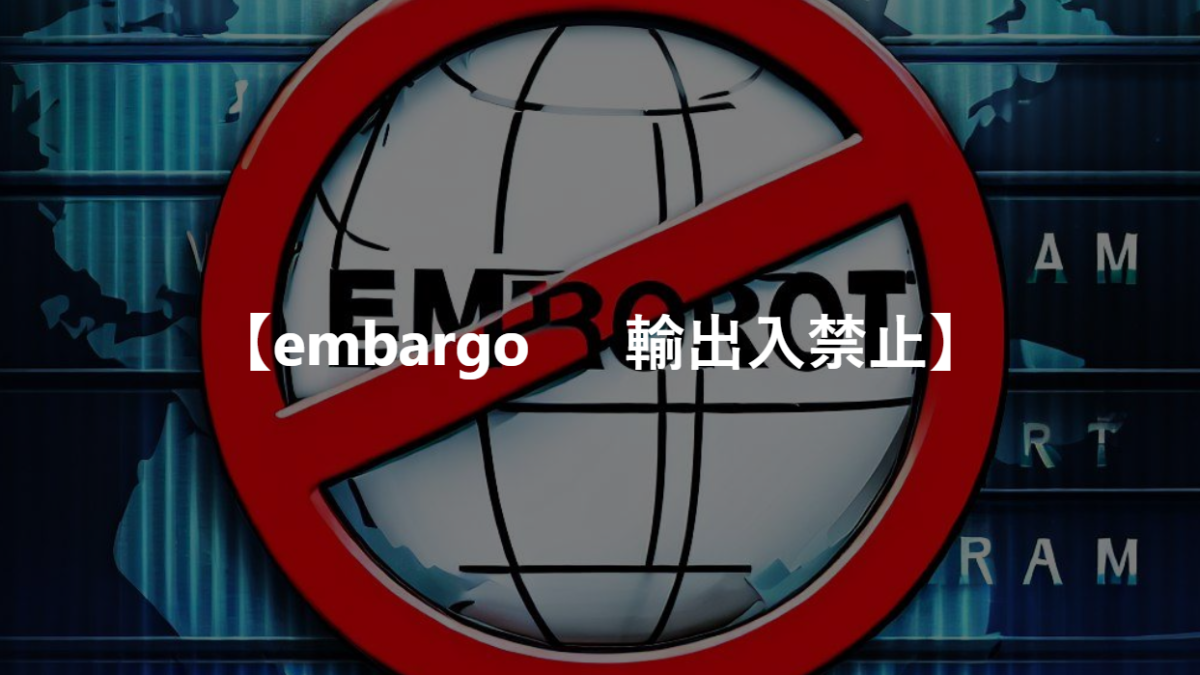【Embargo 輸出入禁止】という単語の語源とか由来を知っていますか?
「Embargo」という単語は、スペイン語の「embargar」から来ており、これは「差し押さえる」や「抑制する」を意味します。この語はさらに、ラテン語の「imbarricare」に由来し、これは「閉鎖する」や「塞ぐ」を意味し、「in」(中に)と「barra」(棒、障害物)の組み合わせから成ります。歴史的に、embargoは船舶や貨物の出入りを法的に禁止する政府の行動を指すために用いられました。時間が経つにつれて、この用語は経済的な封鎖や特定の国への輸出入禁止を意味するように拡大し、経済的な圧力手段として使用されるようになりました。
The term “Embargo” originates from the Spanish word “embargar,” which means “to seize” or “to restrain.” This word, in turn, traces back to the Latin “imbarricare,” meaning “to close off” or “to barricade,” derived from a combination of “in” (into) and “barra” (bar, obstacle). Historically, an embargo referred to the governmental action of legally prohibiting the entry or exit of ships or goods. Over time, the usage of this term expanded to denote economic blockades or the prohibition of exports and imports to specific countries, serving as a means of economic pressure.
この単語の類義語・反対語を教えてください。
類義語
- Sanction – 制裁。特定の行動を強制または制限するための公式な措置。
- Ban – 禁止。特定の活動や物の使用を法的に禁じること。
- Blockade – 封鎖。特定の地域や国への物資の流入を物理的に阻止すること。
- Prohibition – 禁止令。特定の行為や物の使用を法的に禁じること。
- Trade restriction – 貿易制限。貿易に関する活動を制限する政策。
反対語
- Free trade – 自由貿易。貿易障壁を設けずに国々間で商品やサービスを交換すること。
- Open market – 開かれた市場。制限や障害が少ない市場環境。
- Lifting of sanctions – 制裁の解除。以前に課された制裁や禁止令を取り消す行動。
- Deregulation – 規制緩和。法律や規制を撤廃または緩和すること。
- Trade liberalization – 貿易自由化。貿易に関する障害や制限を減少させる政策。
この単語に似た単語で間違いやすい単語はありますか?
- Sanction (制裁): 「Embargo」と混同されがちですが、「Sanction」は経済的、政治的な措置を指し、特定の行為を制限するために国際的に課されることが多いです。「Embargo」が特定の貿易活動に対する禁止を指すのに対し、「Sanction」はより幅広い行動や政策に対する制裁を意味することがあります。
- Boycott (ボイコット): 個人や集団が、政治的、社会的な理由から特定の商品やサービスの購入を拒否する行動です。これは「Embargo」のように政府によって課されるものではなく、民間レベルで起こります。
- Blockade (封鎖): 物理的に特定の地域や国へのアクセスを遮断する行為です。「Embargo」が法的な貿易制限を指すのに対し、「Blockade」は軍事的な手段を含むことがあります。
- Quarantine (検疫): 健康保護のために、病気の拡散を防ぐ目的で特定の地域や人々を隔離する措置です。これは「Embargo」とは異なり、主に公衆衛生と関連があります。
この単語にまつわるエピソードなどはありますか?
「embargo」にまつわる有名なエピソードとしては、1962年のキューバ危機があります。この危機では、アメリカ合衆国がキューバに対して経済的な制裁として完全な貿易禁止を実施しました。
1962年10月、アメリカはキューバからのソ連へのミサイル配備を発見し、これを受けてキューバに対する経済制裁を発動しました。アメリカはキューバとの間の貿易を完全に停止し、キューバへの輸出入を禁止しました。この措置は国際的な緊張を高め、核戦争の危機にまで発展しましたが、最終的には交渉によって解決されました。
この事件は、経済的な制限や禁止が国際政治において重要な手段となることを示す例としてよく引用されます。また、このエピソードは「embargo」の語義とも関連しており、国家間の貿易制限や禁止の重要性を浮き彫りにしました。
A famous episode related to “embargo” is the Cuban Missile Crisis of 1962. During this crisis, the United States implemented a complete trade embargo as an economic sanction against Cuba.
In October 1962, the United States discovered the deployment of Soviet missiles in Cuba, prompting the activation of economic sanctions against Cuba. The United States completely halted trade with Cuba, prohibiting exports and imports to the country. This measure heightened international tensions and led to the brink of nuclear war, but was ultimately resolved through negotiation.
This incident is often cited as an example of how economic restrictions and prohibitions can serve as significant measures in international politics. Moreover, this episode is related to the meaning of “embargo,” highlighting the importance of trade restrictions and prohibitions between nations.
この単語を使った例文を5つほど教えてください。
The country imposed an embargo on the import of certain goods to protect its domestic industries.
(その国は、国内産業を保護するために特定の商品の輸入に対して輸入禁止を課した。)
The United Nations imposed an embargo on arms sales to the war-torn region.
(国連は紛争地域への武器売買に対して禁輸措置を課した。)
The embargo severely impacted the country’s economy, leading to a decline in trade and job losses.
(禁輸はその国の経済に深刻な影響を与え、貿易の減少や雇用の喪失を引き起こした。)
The embargo was lifted after successful negotiations between the two countries.
(両国の間での成功した交渉の結果、禁輸は解除された。)
The international community condemned the embargo as a violation of human rights and called for its immediate end.
(国際社会は禁輸を人権の侵害として非難し、即時の終了を求めた。)
【embargo 輸出入禁止】のコロケーション
- Trade embargo (貿易禁止): ある国が別の国に対して貿易活動を全面的に禁止すること。国際的な紛争や政策に対する反対などの理由から実施されることが多い。
- Oil embargo (石油禁輸): 石油の輸出入を特定の国に対して禁止すること。エネルギー資源が戦略的に使用される場合に見られる。
- Economic embargo (経済禁止): 特定の国に対する全ての経済的取引を禁止すること。これには貿易だけでなく、投資や金融取引の禁止も含まれることがある。
- Lifting of an embargo (禁止の解除): 以前に課された輸出入禁止を撤廃すること。通常は、対象国が特定の条件を満たしたり、国際的な合意に達したりした結果として行われる。
- Imposing an embargo (禁止の実施): 新たに輸出入禁止を課すこと。国際的な緊張の高まりや、特定の政策に対する圧力手段として用いられる。
「Embargo」、つまり輸出入禁止は、国際政治や経済政策の文脈で重要な役割を果たすことがあります。この用語と一緒によく使われるコロケーションには、様々な状況や目的を反映したものがあります。
まず、「Trade embargo」、貿易禁止は、ある国が別の国との間の貿易を完全に禁止する場合に用いられます。これは通常、国際的な紛争や特定の政策に対する抗議の形として実施されることが多いです。
「Oil embargo」、石油禁輸は、石油という戦略的な資源の輸出入を特定の国に対して禁止することを指します。この種の禁止は、エネルギー供給をコントロールする手段として使用されることがあります。
「Economic embargo」、経済禁止は、特定の国への全ての経済的取引を禁じることを意味します。これには貿易だけではなく、投資や金融取引の禁止も含まれる場合があります。
一方で、「Lifting of an embargo」、禁止の解除は、以前に課された輸出入禁止を取り消す行動を指します。この措置は、通常、対象国が特定の条件を満たしたり、国際的な合意に至った結果として行われます。
最後に、「Imposing an embargo」、禁止の実施は、新たに輸出入禁止を課すことを意味します。これは、国際的な緊張の高まりや、特定の政策に対する圧力をかける手段として用いられることがあります。
これらのコロケーションを通じて、「embargo」がいかにして国家間の関係調整や特定の政治的・経済的目標達成のための手段として使用されるかが明らかになります。
“Embargo,” or the prohibition of imports and exports, plays a significant role in the context of international politics and economic policy. The collocations frequently used with this term reflect various situations and purposes.
Firstly, “Trade embargo” refers to the complete prohibition of trade between one country and another. This is typically implemented as a form of protest against international conflicts or specific policies.
“Oil embargo” denotes the prohibition of exporting and importing oil to and from a specific country, using this strategic resource as a means to control energy supplies.
“Economic embargo” signifies the banning of all economic transactions with a particular country, which may include not just trade but also prohibitions on investments and financial transactions.
On the other hand, “Lifting of an embargo” refers to the action of revoking a previously imposed ban on imports and exports. This measure is usually taken as a result of the target country meeting certain conditions or reaching an international agreement.
Lastly, “Imposing an embargo” means to newly enforce a prohibition on imports and exports. This can be used as a means to escalate international tensions or exert pressure against specific policies.
Through these collocations, it becomes clear how “embargo” is used as a means to adjust relationships between nations and achieve specific political or economic goals.
embargoを使った文法問題
- The government imposed an _____ on all trade with that country due to its human rights violations.
- (A) embargoes
- (B) embargo
- (C) embargoed
- (D) embargoing
解答と解説: (B) embargo
解説: impose an embargoで「禁輸措置を課す」という表現になります。embargoesは複数形、embargoedは過去形・過去分詞、embargoingは現在分詞で、文意に合いません。
- The _____ on oil exports caused a significant increase in domestic fuel prices.
- (A) embargoes
- (B) embargo
- (C) embargoed
- (D) embargoing
解答と解説: (B) embargo
解説: 空欄にはtheの後に続く名詞が入ります。embargoは「輸出入禁止」という意味の名詞です。
- The United Nations Security Council voted to lift the _____ after the country agreed to comply with international regulations.
- (A) embargoes
- (B) embargo
- (C) embargoed
- (D) embargoing
解答と解説: (B) embargo
解説: lift the embargoで「禁輸を解除する」という表現になります。
- The company’s ships were _____ in the foreign port due to the trade dispute between the two countries.
- (A) embargoes
- (B) embargo
- (C) embargoed
- (D) embargoing
解答と解説: (C) embargoed
解説: 船が「抑留された」という受動態を表すには過去分詞であるembargoedが適切です。
- The _____ had a devastating impact on the country’s economy, leading to widespread shortages and unemployment.
- (A) embargoes
- (B) embargo
- (C) embargoed
- (D) embargoing
解答と解説: (B) embargo
解説: 空欄にはtheの後に続く名詞が入ります。embargoは「輸出入禁止」という意味の名詞です。

